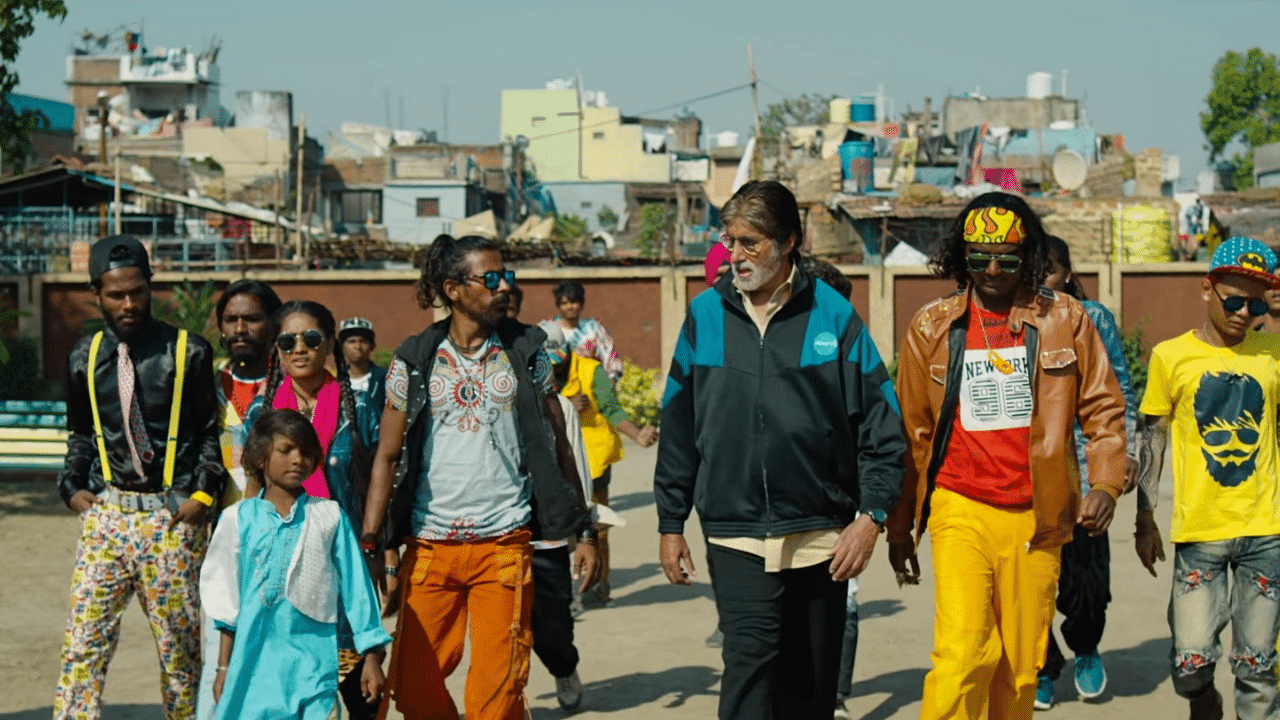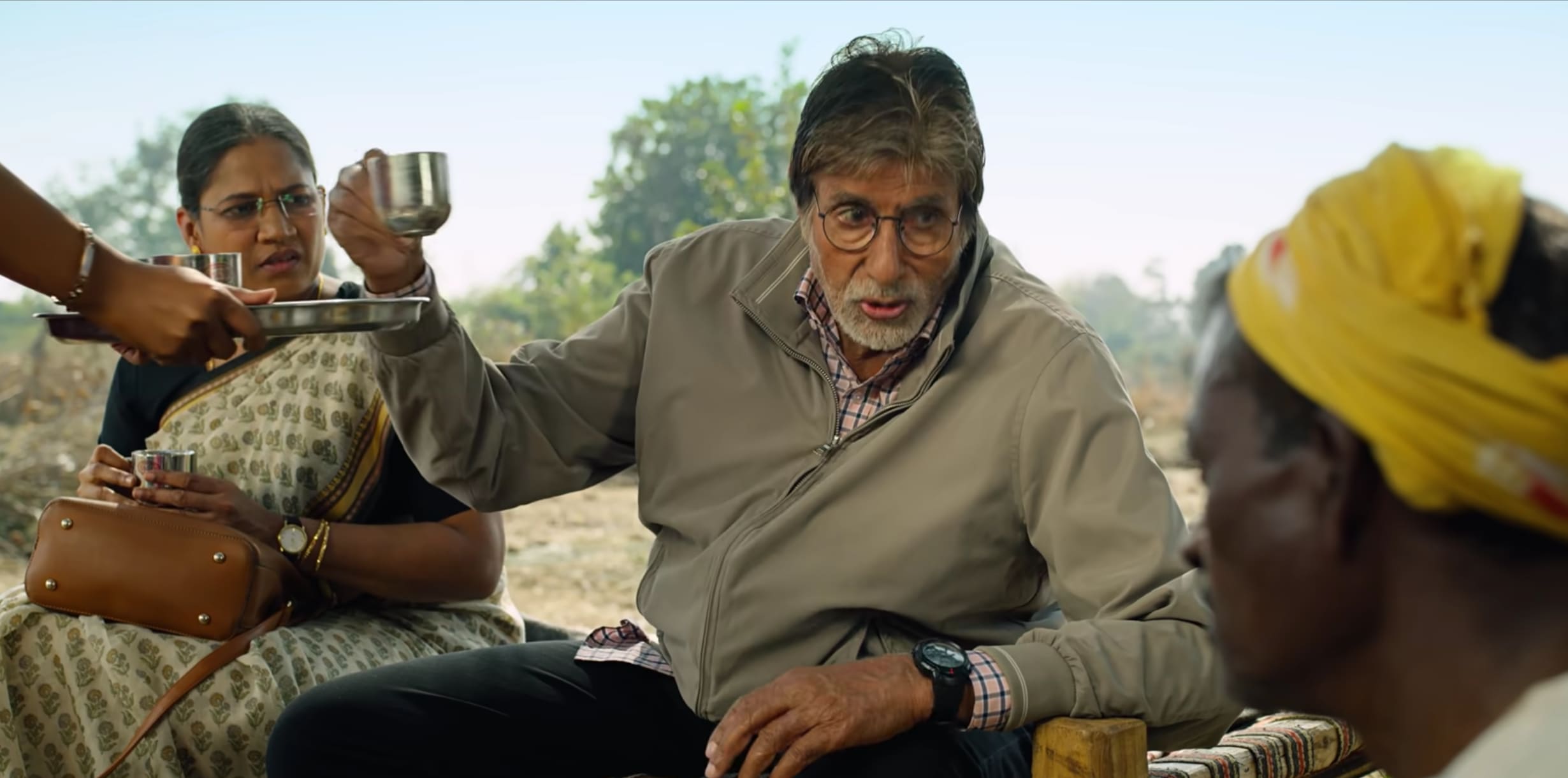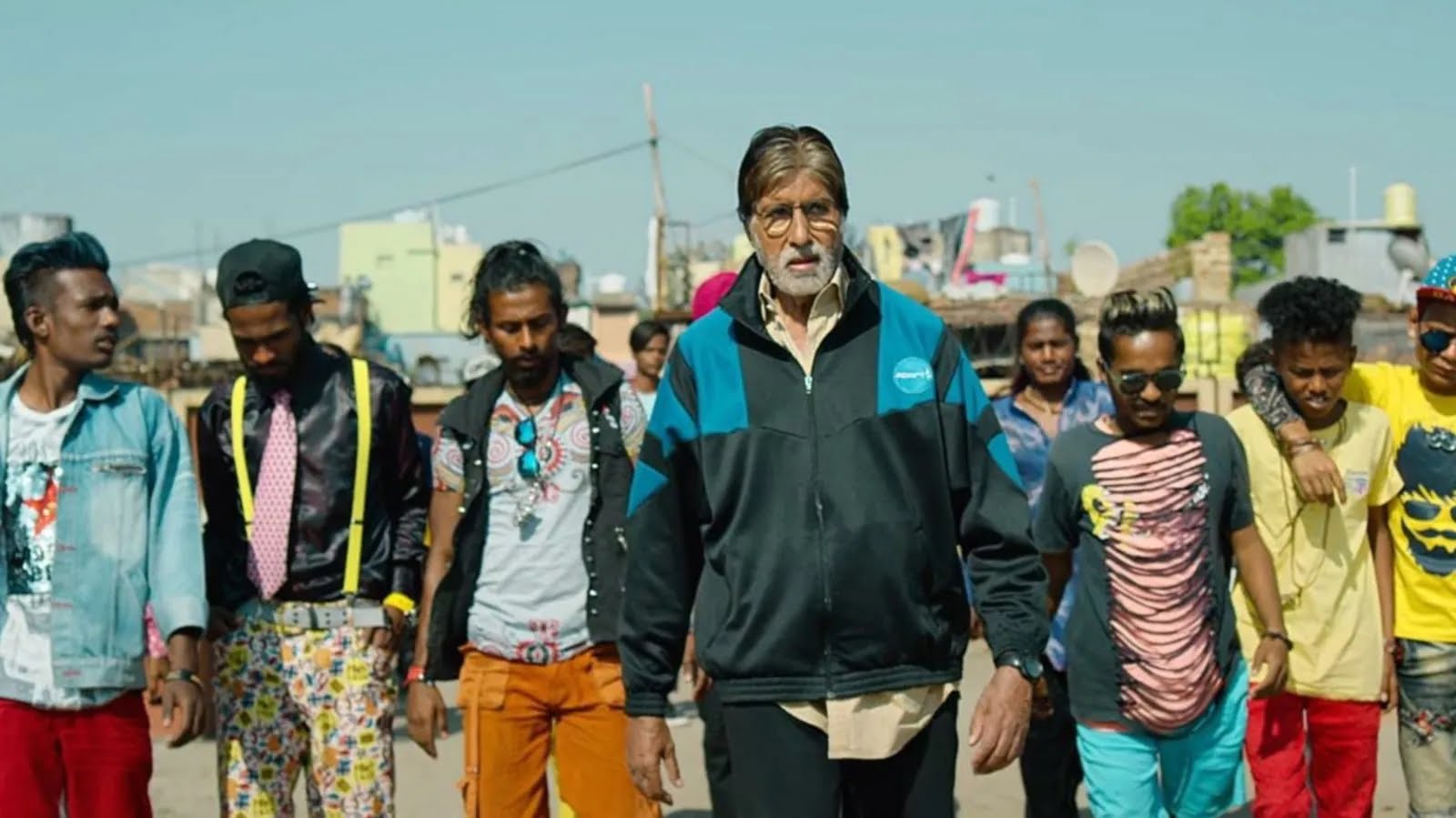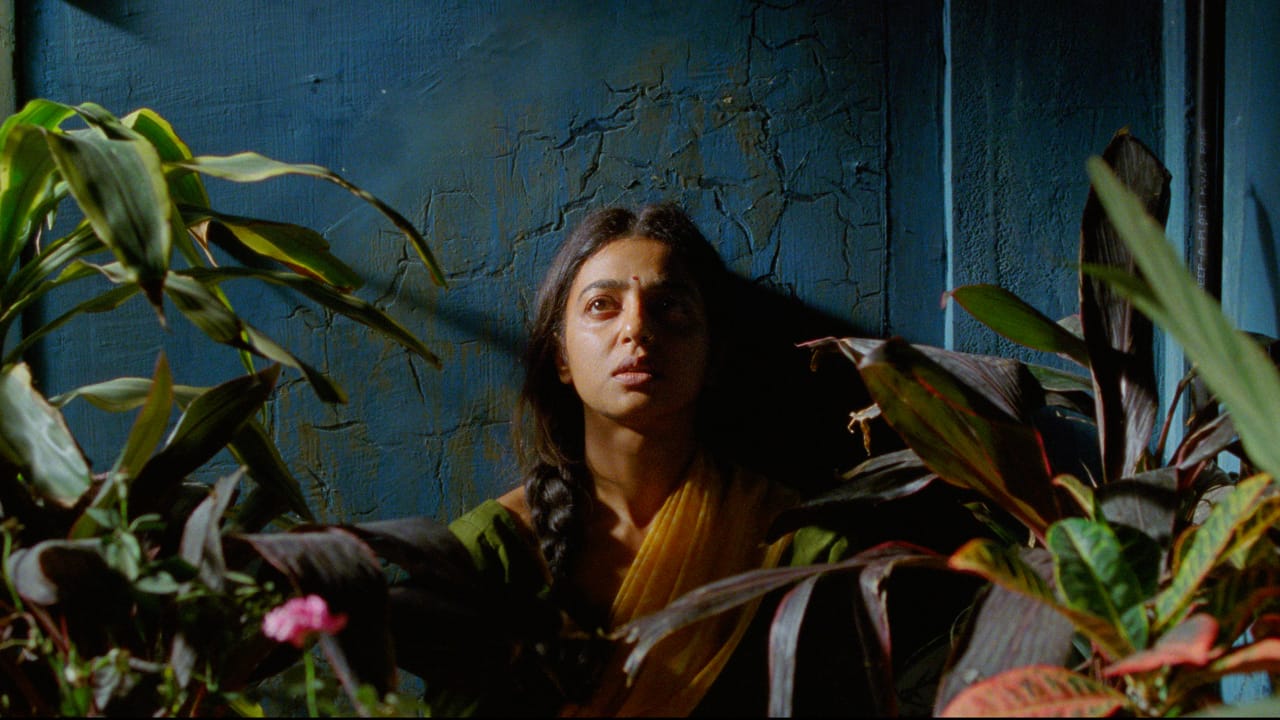Editor’s Note: Filmmaker Nagraj Manjule has been accused of domestic violence. Even as FII is platforming a review of the film by the director, which is of historic relevance to the anti-caste discourse, the publication continues to stand by and believe in the survivor’s narrative.
Jhund is the Hindi film debut of Nagraj Popatrao Manjule, one of India’s most prominent anti-caste voices of contemporary times. Nagraj Manjule’s ‘Aatpat’ production house has made significant contributions to Indian cinema with ‘Pistulya’, ‘Fandry’, ‘Sairat’, ‘Naal’ and some shorts like ‘Pavsacha Nibandh’ and the most recent ‘Vaikunth’ in the Unpaused anthology. Manjule has created an iconic signature brand in the Indian film industry by his revolutionary, traditionally-subaltern and yet rising narratives of the historically oppressed sections of society. With Jhund, Manjule has created a reflexive mirror for the dominant Savarna storytellers of Bollywood who naturally focus on victimisation of Dalit testimonies. In Jhund, Manjule confronts caste, among other forms of social inequities, ongoing discrimination and hierarchies with an anti-caste lens and aesthetics.
With ‘Jhund’, Manjule has created a reflexive mirror for the dominant Savarna storytellers of Bollywood who naturally focus on victimisation of Dalit testimonies. In Jhund, Manjule confronts caste, among other forms of social inequities, ongoing discrimination and hierarchies with an anti-caste lens and aesthetics.
The filmmaker’s epistemic position and locational reality stands out throughout the film. Jhund which is another realistic story where he first time working with star Amitabh Bachchan who playing a lead role as Prof Vijay Barse. Jhund is based on ground field reality, and focuses on the narrative of retired Professor Vijay Barse, a social worker based in Nagpur who established Slum Soccer, an organisation which uplifts underprivileged children through football. Seven years ago, professor Vijay Barse’s story ‘A Ball Can Change the World’, broadcast on Aamir Khan’s Satyamev Jayate made many sit up and notice.
Also read: Jai Bhim Film Review: Powerful Yet A ‘Voice For The Voiceless’ Narrative
Jhund is the story about how Vijay changes the lives of oppressed community youngsters in a Nagpur slum, by providing them hope via football. The sport transforms their lives slowly, taking them away from criminality, drugs, violence, police brutality, etc. and gives them hope to become a better human being for a better tomorrow. In Jhund, audience will recognise many faces from some of the director’s previous movies, including Pistulya (Suraj Pawar) from Pistulya, Jabya (Somnath Avghade) from Fandry and Parsha (Akash Thosar), Salim (Arbaz Shaikh), Archi (Rinku Rajguru), Pradeep (Tanaji Galgunde) from Sairat.
Jhund shows how in Gaddi Godam in Nagpur, a locality is divided into two by one brick wall. On one side, a locality of so-called ‘pure’ civilians reside and on the other, unseen civilians who are often called ‘Gandagi’ (dirt/filth) of Zopadpatti (Slum) reside. The wall symbolizes the caste divide stands between the slum and the outside world. Don (Ankush Masram) and his friends must overcome this literal as well as the metaphorical one on a daily basis. The movie is about many ‘raw’ and ‘real’ terrific scenes but some of them are so affecting, they stand out.

Jhund showed a slum life where young faces of Basti (slum) addicted by drugs, alcohol, smoke before getting involve in playing a football. The first scene in which Vijay is just sitting in his living room with his Slum team and those young people share about themselves, everyone has same story which is basically about the social structures that ostracise them. One character named Babu observes that this is first time that anyone has shown any interest in their lives. He says, ‘Kissi ne nahi poocha, tu kaisa hai’ (No one asked yet how are you?). It’s a sentiment repeated in the title song, ‘Aya ye Jhund hai’, written by Ajay-Atul. Through the efforts of professor Vijay and football, these youngsters finally feel seen.
Nagraj Manjule displays stellar filmmaking and his knack for framing the scenes in such a way that they speak the language of anti-caste ideology. In Jhund, Bollywood cinema witnesses the celebration of Bhim Janyanti for the first time. We see the waving of Panchshil flag, chanting of Jai Bhim and the Bollywood veteran Amitabh Bachchan standing with folded hands and paying homage towards Shivaji, Shahu, Jyotiba and Babasaheb Ambedkar’s portraits. There is not a single frame that does not have a meaning that is not significant to the anti-caste discourse.

Jhund is an assertion and call for representation. There are several scenes that have so much power and poetry to them. In one such, we see Don witnessing a situation when his crew’s frustration, fury and self-destructive streak is tragically palpable. In this heartbreaking shot, Don is shown sitting in a large, abandoned warehouse, yelling and crying loudly because his life has hit a dead-end. The unbearable sorrow of a young man belonging to an oppressed caste community who has been denied opportunities because of a hierarchical system designed to deny him the treatment of a human being. This becomes the reality of many Dalit men and thus, ‘Aaya ye Jhund hai’ and ‘Laat Maar’ become nothing less than raucous war cries.
Manjule provides an intersectional and feminist perspective through the story of a young Muslim woman, who is a wife and mother, who loves to play football. Jhund also highlights the narrative of a security guard who turns out to be a solid player when given the opportunity to play but was not allowed to even touch football before.
The outstanding dialogues writing like, ‘Janam se koi apradhi nahi hota’ (No one born as criminal) or ‘Yeh bacche jeene ke liye sangharsh kar rahe hain.’ (These children are struggling to just living a life), gives a distinctive voice and aesthetic to the film.
In one scene, Monica, a village girl who has never had an identity, gets selected for the national slum football team and needs ‘Pehchan Patra’ (identification proof) and is shown going from pillar to post with her father just to prove her identity as an Indian citizen. This is not just Monica’s story, but across the country there are people from marginalised caste communities who have to face discrimination in the digital realm as well.
Also read: Film Review: Fandry, A Tale Of Transgenerational Resistance Against Caste Oppression

At one point, her father exclaims: ‘Aadmi ki koi keemat hi nahin’ (There is no value of a person). It’s a tough truth and that reminds me of these lines from Rohith Vemula’s letter: “The value of a man was reduced to his immediate identity and nearest possibility. To a vote. To a number. To a thing. Never was a man treated as a mind.”
In a court scene, Vijay (Amitabh Bachchan) says, ‘Ye samaj ke Bahishkrut log hai’, ‘aap kahte hai ye Jhund hai, mai kahata hu ye hamari National football team hai’ (You say that this is wild horde, I say this is our National Football Team). Again, in that same shot, he tells a judge, ‘No matter how much talent they have, they can’t reach you. There is just too large a wall.’
The last scene shows an airplane flying over a slum in Nagpur, where a writing on the wall reads: ‘Crossing the wall is strictly prohibited’ and yet, the Slum Soccer team does, both the symbolic and literal ones. As our feet tap to the thumping beats of the song by Ambedkrite Rap Star Vipin, our hope, courage and strength also rise.
‘Jhund’ is a meaningful movie which elucidated the face of Bahishkrit Bharat (Ostracised India). On 3 April 1927, Dr. B. R. Ambedkar launched Bahishkrit Bharat, which is the decisive challenge to Brahmanism where Dr Ambedkar focused on the issue of the liberation of the marginalised and gives the testimony to his deep commitment to the cause. He had expressed his deep concern: Will they get the right to live with dignity? Will all Indians treat the ostracized as their equal? What should the ostracized do to secure their equals? Jhund asks the same questions, in a different way.
Jhund is a meaningful movie which elucidated the face of Bahishkrit Bharat (Ostracised India). On 3 April 1927, Dr. B. R. Ambedkar launched Bahishkrit Bharat, which is the decisive challenge to Brahmanism where Dr Ambedkar focused on the issue of the liberation of the marginalised and gives the testimony to his deep commitment to the cause. He had expressed his deep concern: Will they get the right to live with dignity? Will all Indians treat the ostracized as their equal? What should the ostracized do to secure their equals? Jhund asks the same questions, in a different way.
Shivani Waldekar is a research scholar pursuing MSc By Research in Social and Political Sciences from The University of Edinburgh, Scotland, United Kingdom. You can reach out to her on S.G.Waldekar@sms.ed.ac.uk and shivani.k.waldekar@gmail.com. You may find her on WordPress, Twitter, Facebook and Instagram.
Featured image source: Hindustan Times




